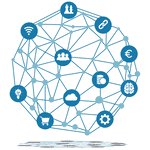A Glimpse Into Our Tech-Driven Future with Artificial Intelligence
Introduction
The term “Artificial Intelligence” or “AI” has become more common in our conversations these days, and there’s a strong reason for that. Once imagined only in the realms of fiction, AI is now a driving force in current technology. It’s more than just a trending topic; it’s changing how businesses and industries operate. From our smart gadgets to the personalized recommendations we get online, AI plays a pivotal role. As we navigate this tech-savvy time, it’s valuable to grasp the beginnings of AI and its significance.
Also read our earlier blog on AI Adoption.
Historical Overview
The idea of creating machines that can mimic human thought isn’t entirely new. Stories from ancient Greece hinted at robots, while Chinese tales described man-made beings. The structured path to what we know as AI began in the 20th century. A pivotal moment was when Alan Turing, a renowned British mathematician, introduced an essential query in 1950: “Can machines think?” This led to the Turing Test, a benchmark to check if a computer can reflect human-like reasoning. The journey of AI hasn’t been straightforward. There were phases of exciting breakthroughs and times of doubt, known as “AI winters”. Yet, with the persistent efforts of experts and evolving tech tools, we’ve reached an era where AI’s influence is undeniable and continuously growing.
Understanding AI
Artificial Intelligence, commonly known as AI, is all about making machines think and work like us. It’s a broad field with different parts to it. One of these parts is Machine Learning (ML). Here, the system learns independently from data, getting better at its tasks without us having to tell it every step. Go a level deeper, and you get to Deep Learning. Consider this a specialized part of ML, modelled by how our brains work using neural networks. These networks are like a web of nodes, working together and learning from patterns. So, to simplify: Deep Learning is a kind of Machine Learning, and both are categories within AI. Even as technology evolves and becomes more intertwined, one thing is clear: the potential of these tools to change our world is enormous.
Everyday Wonders of AI
AI isn’t just a fancy term; it’s all around us. Many of us start our day with a smartphone alarm, smartly set by AI, to wake us up at the best time based on our sleep. When we ask virtual helpers like Siri or Alexa about the weather or our plans for the day, AI helps them answer.
During downtime, when watching movies on Netflix or shopping on Amazon, AI suggests what we might like next. But it’s not all just fun and games. AI is making significant differences in critical areas. For example, in hospitals, AI helps doctors detect diseases early, which can sometimes mean the difference between life and death. In the world of medicine, AI is speeding up the discovery of new drugs. On the streets, cars with AI technology aim to make our journeys safer. And in businesses, AI helps predict market trends, assisting in smarter decisions.
How AI Affects Our Society
AI is everywhere, and it’s changing a lot of things. One big change? Jobs. As machines take over some tasks, people worry about losing their jobs. But here’s the silver lining: with new technology comes new job roles that didn’t exist before. It’s like when the internet came, and we suddenly had web designers and social media managers.
However, AI brings up some tough questions. For instance, sometimes AI systems can pick up and even act on the biases of the people who made them. This can lead to unfair decisions. As we let AI make more decisions for us, we need to think about who’s responsible when things go wrong. And with AI helping in things like recognizing faces, there are big debates about privacy and how this technology might be misused.
What the Future Might Hold with AI
Looking forward, AI has a ton of potential. Picture super-powerful computers, way stronger than what we have now, using AI to tackle enormous challenges. Problems like global warming might get fresh, effective solutions. And in healthcare, AI could lead to breakthrough treatments and even new ways to care for patients. Predicting every turn on AI’s path might be challenging, but one thing is sure: it can reshape the world in ways we can only imagine.
Why Everyone Should Have Basic Knowledge of AI
AI plays a central role today, where everything is becoming increasingly digital. It’s not just something researchers and tech experts talk about; it’s actively reshaping how businesses operate and how we live our daily lives. Whether it’s the movies we watch, how we shop, or the medical treatments we might receive, AI has a hand in it. Having even a basic grasp of AI means better navigating this evolving landscape. For anyone looking to stay relevant in their profession or to understand the tech shaping their world, learning about AI is becoming as essential as knowing how to use a computer or smartphone.
Conclusion
Artificial Intelligence has moved past being just another buzzword in the tech world. It is a powerful testament to human ingenuity and our drive to shape the future. As we continue this journey through the digital age, foundational knowledge of AI is akin to holding a map; it helps guide us through the intricate maze of technological advancements. By understanding AI, we’re not just keeping up with the times—we’re actively engaging with the future. And in this vast ocean of possibilities, every discovery promises to be even more exciting than the last.
Call to Action
We’d love to hear from you! Share your thoughts on AI, pose questions, or suggest future topics you’re curious about. Together, let’s embark on this exciting journey of discovery and understanding.

